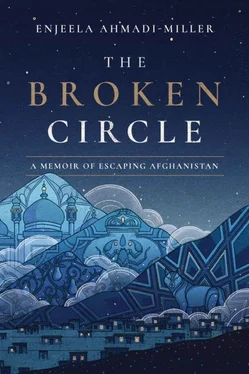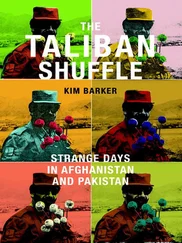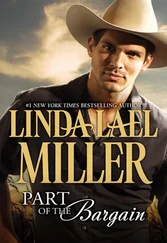Padar steered us toward the baggage carousels at the far end of the airport. With our luggage in hand, we headed toward passport control. He told us as we gathered around him that the train station was not too far from the airport. Once we were outside, we would catch a bus to the station. My excitement rose as we approached men in uniforms who were checking each passenger’s paperwork as they passed through to the exit. I could see through the glass doors on the other side of them. Outside, where passengers waited for rides. Some boarded buses; others were bundling their things into taxis and vans and autos—everyone was leaving, and we’d be leaving soon too, on our way to India.
At first I didn’t recognize where the voices were coming from, I just knew they grew louder as I watched people streaming out the doors toward their destinations.
“No, no, no, you cannot enter with these,” the guard said to a smiling Padar, who stood, holding the ticket packets out to him. The guard towered over him. With an angry glare, he pushed the packets back hard into Padar’s chest. He acted as if he’d been insulted, the way he glared at Padar and then at us behind him. “Where are your passports? Where are they?” he shouted in Urdu.
The guard’s voice was so agitated that others rushed over. The men spoke among themselves in a language I didn’t understand, with animated hands. Padar interjected once in a while, gesturing to the packets in his hand as if saying these were enough. They all disagreed, shaking their heads; one wagged his finger at Padar as if he were a child and should know better. Another shouted insults in his face in a manner that was clear and precise in any language. Padar, with his normal calmness, in a warm, soothing voice, implored them to take a look at the packets. “Just take the packets, please do us this kindness. This would be best for the children, to let us leave and be on our way. We are simple refugees trying to return to our family,” Padar pleaded.
As nice and pleasant as my father was, it only set the loud, tall guard on fire. With his head shaking, his eyes pulsing with the passion of an injured soul, he began pushing Padar backward, toward us, ranting of all the infamous things he would do to us for trying to break the law. Padar tried to hold his ground, but the big man shoved him out of line, and the other guards took us by the arms. One ugly, gap-toothed, dark-faced border guard gripped my arm as if I were a murderer finally captured after a long hunt. We were dragged out of line; our own shouting, mingled with the angry threats of the guards, created a world of noise and chaos that enveloped us until we landed on the cold floor of a windowless room. Our luggage crashed to the floor beside us. The door slammed, and a latch caught on the other side. The sudden silence and coldness of the dirty tile shot through me all at once. I pushed myself to my knees.
I forced myself not to cry. “What happened?” I asked. “What are they talking about, breaking the law?”
Padar didn’t answer. He brushed off his clothes and straightened his shirt. He helped each of us up and had us crowd together on the small bench. The stench of the dingy room caught up to me as I wiped my face with the sleeve of my dress. The room once had been painted white, but now the walls were scuffed and bruised as if a thousand brawls had taken place here—people bashed against the walls as punishment for what, I couldn’t imagine.
Padar paced the length of the tight room a few times, turning after a few steps, pinching his lips together, as if trying to frame the words to explain to us what had just happened.
He paused, and with one hand on his hip, he faced us. “We have no passports.”
Laila sighed. Zulaikha caught a breath.
“Why didn’t we get them in Karachi?” Zia asked.
Padar only shook his head, as if thinking hard about his question. “It was impossible to get our passports in Pakistan. I tried very hard.” He stared down at the floor. “So many others from Afghanistan had passed through this way, I thought we could too.”
“How are we going to get to India?” Zulaikha asked.
He finally looked up at us. The strain and fatigue began to pass from his face. “Don’t worry. I believe this is the way for us. We will succeed in reaching New Delhi.”
He stood there in front of us with a half smile on his face. This was like a giant game to him, a chess match of international wits. A test of his faith in Allah or the power of poetry to overcome all odds.
He went back to pacing. We sat in silence. Still I shivered at being treated like criminals. Freedom had been so close; I could have reached out to the glass doors that led outside and touched them, but now…
“Is that why we couldn’t fly directly to New Delhi?” Laila asked.
He nodded. “I was told this was the easiest route across the border. Many others have entered India through Dhaka…” He started to say more but fell back into pacing.
We huddled together for warmth while he worked the floor on the other side of the room.
“What’s going to happen to us?” I whispered to Laila. She seemed too shocked to answer. She shook her head; she didn’t know. We sat hunched together for what seemed like hours, until someone fumbled with the latch on the other side of the door. Padar ceased pacing. I froze into a tight band of muscle, ready to fight back if they tried to beat me. Zulaikha, on the other side of me, clutched my arm.
The door swung open, and a Bangladeshi policeman stepped into the room, an aide behind him. He was definitely the man in charge. Thin, with a tight-fitting blue uniform, perfectly pressed, and a breast full of colorful badges, he glanced over us with an imperious air. Two gold diamonds and a golden leaf gleamed on his epaulets. He had a wispy black mustache on his dark olive skin. A blue beret with a gold medallion was cinched down over his short black hair. Despite his stern demeanor, he had the softest dark eyes. I wondered if he had any children of his own.
He stood erect, as if he were born that way.
He held a document in his hand and one of the ticket packets Padar had tried to pass to the border guards. “Are you Abdullah Ahmadi of Kabul?” he asked. His voice had an official tautness to it.
“Yes, I am,” Padar said from across the room. “And these are my children.” He spread out his hands toward us. “Zia, Laila, Enjeela, and Zulaikha. We are on our way to New Delhi to be reunited with my wife.”
“And you expected to pass through customs without passports,” the policeman said, holding up one of the packets stuffed with rupees. The bills hung out of the ticket folder like wilted lettuce.
“We have been deprived of our rights by the Afghan government to emigrate legally. We have come here as political refugees,” he said, speaking confidently.
“I have spoken to the Afghan embassy. I was told that’s not the case. That if you had applied through proper channels in Kabul, you would have been given every consideration as any Afghan citizen.”
“I would have been jailed by the Soviet puppet government if I had applied to emigrate. You well know that.”
“I know nothing of the sort. The Afghan ambassador is adamant that you return to Kabul, Mr. Ahmadi.” He folded the bills back into the packet and handed it to his aide. “Apparently you have some unfinished business there. Once that is complete, I’m sure you will be allowed to emigrate as you wish.”
“We are political refugees,” Padar protested.
“You mock us with your conduct, Mr. Ahmadi. We have no such status for those who would bribe their way past our customs.” He held out his hand. “Please give me the other packets you offered the guards.”
He dug them out of his coat pocket. The officer checked each one. “We will purchase one-way tickets for you and your family’s return to Kabul. You can apply for your passport and exit visa through proper channels. Then you can return to our beautiful country at your leisure, as a treasured guest.”
Читать дальше












